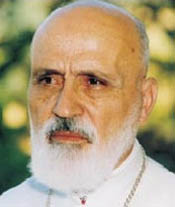 |
| Vol. 3 No. 4 | Table of Contents MEIB Main Page | April 2001 |
| Document File: Lebanon |
 |
| Nasrallah Boutros Sfeir |
Lebanon is a peace loving country which wants to live in peace with all its neighboring countries, including Syria and Israel. As a matter of fact, the Maronite Church and the Lebanese people cherish the same values of democracy, respect for human rights, independence and sovereignty cherished by the American people. The entry of the Syrian troops into Lebanon in 1976 was done without the request or permission of anyone, as stated by former President Hafez al-Assad in his speech of July 20, 1976. This was also noted by former Secretary of State Henry Kissinger in his book. From that time Syria has established its hegemony over Lebanon.
While we have always advocated good relations between Syria and Lebanon, true international relations are possible only when the countries involved relate to each other on an equal footing. They cannot be established if one country dominates the other. Within the country, the people of Lebanon seek to be democratic, where Christians and Moslems live in peaceful co-existence, unless an outside element provokes a conflict. We seek human and religious values--faith in God, justice, equality, respect for human rights.
Lebanon stands in the Middle East between Israel and Syria, and has suffered difficulties for a quarter of a century--17 years of war, thousands of victims, and terrible destruction. The Taef Agreement of 1989 was supposed to bring an end to the war. The United States was a principal sponsor. However, Taef has been implemented only partially and in a discriminatory fashion. As a result, Lebanon has yet to recover its institutional foundations. If the cannons are silent, anxiety still remains. The country suffers from a succession of crises due to the political situation in Lebanon, in which Lebanon lacks sovereignty, independence, and freedom in its decision-making.
The South of Lebanon is still in a state of instability. A large number of its citizens are either in exile, displaced or in prison, leaving their families in dire straits. The Israeli-Palestinian negotiations raise the question of the final settlement of the Palestinian refugees, who have a right to a just solution. However, no agreement should be made at the expense of the Lebanese people. Imposing on tiny Lebanon a large foreign population would have dire demographic effects, since Lebanon already has the highest population per capita in the region. It destabilizes the balance between Christians and Moslems, and even among the Moslems themselves.
It is in the interest of the United States to help Lebanon for the following reasons:
I know that you have the same view as we, namely, that there should be no outside hegemony over Lebanon, even after the departure of non-Lebanese troops. Lebanon should remain an oasis of democracy, freedom, human values, and respect for human rights. Again, thank you for your welcome and support. May God bless you in your important work.